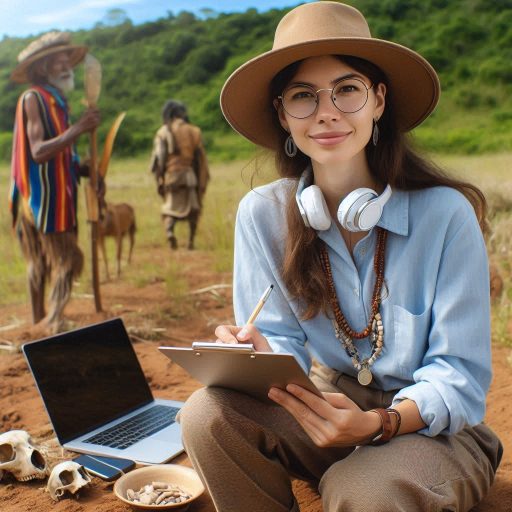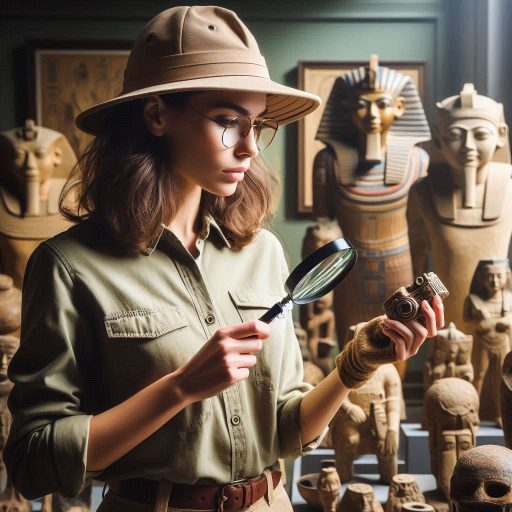Introduction
Anthropology is the study of human societies and cultures.
It examines their development, customs, and beliefs.
This field helps us understand the diversity of human experiences.
Famous anthropologists have significantly shaped anthropology through their groundbreaking research.
Figures like Franz Boas, Margaret Mead, and Claude Lévi-Strauss revolutionized our understanding of culture.
Boas challenged notions of cultural superiority and promoted cultural relativism.
His work emphasized the importance of understanding cultures on their terms.
Margaret Mead studied gender roles and adolescence in various cultures.
Her book, “Coming of Age in Samoa,” revealed how culture shapes development.
Mead’s research influenced feminist anthropology and broadened perspectives on gender.
Claude Lévi-Strauss introduced structuralism to anthropology.
He explored the underlying structures that shape human thought and culture.
His analysis of myths and kinship systems provided valuable insights into cultural patterns.
Other notable anthropologists, such as Mary Leakey and Bronislaw Malinowski, made significant contributions.
Leakey’s discoveries advanced our understanding of human evolution.
Malinowski established participant observation as a key research method.
These anthropologists fostered cross-cultural understanding and highlighted the importance of ethical research practices.
Their legacies continue to inspire new generations in the field of anthropology.
Franz Boas
Background Information on Boas
Franz Boas was a German-American anthropologist born on July 9, 1858, in Minden, Germany.
He is often regarded as the father of modern anthropology.
Boas earned his Ph.D. from the University of Berlin in 1881.
His early research focused on the Inuit of Baffin Island.
He moved to the United States in 1885, where he influenced American anthropology significantly.
Boas established the first anthropology department at Columbia University in 1896.
He trained many students who later became influential anthropologists themselves.
Boas’s emphasis on fieldwork set a new standard for anthropological research.
Contributions to Cultural Anthropology
Franz Boas made numerous contributions to cultural anthropology.
He challenged the prevailing evolutionary theories of the time.
Instead of viewing cultures as stages of development, he emphasized their uniqueness.
Boas argued that each culture should be studied in its context.
This approach allowed for a more in-depth understanding of cultural practices.
He advocated for detailed ethnographic research to capture cultural diversity.
His work included extensive field studies and data collection.
Boas published several influential books and articles that shaped the field.
His most notable works include “The Mind of Primitive Man” and “Race, Language, and Culture.”
Boas introduced the concept of historical particularism.
This idea asserts that each culture is shaped by its unique historical circumstances.
He believed that anthropologists should avoid making broad generalizations about cultures.
Instead, they should focus on specific cultural contexts.
This perspective transformed how anthropologists approached their studies.
It also laid the groundwork for future research in cultural anthropology.
Influence on the Concept of Cultural Relativism
Franz Boas played a crucial role in developing the concept of cultural relativism.
He argued that all cultures have their own values and beliefs.
His views challenged the ethnocentric attitudes prevalent in his time.
Boas emphasized that no culture is superior to another.
This understanding promotes respect for cultural diversity and tolerance.
Cultural relativism encourages anthropologists to analyze cultures without bias.
It helps researchers appreciate the complexities of different societies.
Boas’s ideas have had a lasting impact on anthropology and beyond.
They foster a greater understanding of global cultures in today’s interconnected world.
His influence can be seen in contemporary debates about cultural practices and values.
Franz Boas significantly shaped cultural anthropology.
His commitment to empirical research and cultural relativism transformed the discipline.
His legacy continues to inspire anthropologists to this day.
Boas’s work reminds us of the importance of understanding cultural diversity in our global society.
Read: Botany Career Fairs and Networking Events
Margaret Mead
Overview of Mead’s Work in Anthropology
Margaret Mead was an influential American cultural anthropologist born on December 16, 1901, in Philadelphia.
She earned her Ph.D. from Columbia University in 1929.
Mead focused on the study of culture and personality.
Her work emphasized the relationship between culture and individual behavior.
She conducted extensive fieldwork in various Pacific island cultures.
Mead’s research methods combined observation with personal interviews.
She became a prominent public intellectual and often engaged in social issues.
Her accessible writing style made anthropology appealing to a broader audience.
Mead’s work challenged conventional views about human behavior and social norms.
Famous Studies: “Coming of Age in Samoa”
One of Mead’s most famous studies is “Coming of Age in Samoa,” published in 1928.
In this groundbreaking work, she examined adolescent girls in Samoa.
Mead sought to understand how culture shapes personality development.
She argued that Samoan culture allowed for a more relaxed approach to adolescence.
Her findings suggested that cultural factors influence the experience of growing up.
Mead contrasted her observations in Samoa with Western norms.
She believed that societal expectations play a significant role in shaping behavior.
“Coming of Age in Samoa” became a bestseller and sparked widespread interest in anthropology.
Mead’s work prompted discussions about the nature of adolescence and gender roles.
Her research inspired future generations of anthropologists to study human behavior through a cultural lens.
Influence on Gender Studies and Feminist Anthropology
Margaret Mead significantly impacted gender studies and feminist anthropology.
She challenged traditional notions of gender roles in her work.
Mead emphasized that gender is not solely biologically determined.
Instead, she highlighted the cultural influences on gender identity and expression.
Her studies demonstrated that gender roles vary across cultures and can be socially constructed.
Mead’s work inspired feminist anthropologists to explore women’s experiences.
She encouraged researchers to examine the intersections of gender, culture, and power.
Mead advocated for women’s rights and social justice throughout her life.
Her contributions to feminist theory remain relevant in contemporary discussions about gender.
Mead’s insights also influenced broader societal views on gender roles.
Her work encouraged people to rethink conventional assumptions about masculinity and femininity.
She argued for the importance of understanding cultural context in shaping gender identity.
Margaret Mead’s contributions to anthropology continue to resonate today.
Her studies, particularly “Coming of Age in Samoa,” challenged traditional views of adolescence and gender.
Mead’s legacy as a pioneer in cultural anthropology inspires ongoing research in gender studies and feminist anthropology.
She remains a prominent figure in discussions about culture, identity, and human behavior.
Read: Preparing for a Botany PhD: Tips and Advice
Claude Lévi-Strauss
Background Information on Lévi-Strauss
Claude Lévi-Strauss was a French anthropologist born on November 28, 1908, in Brussels, Belgium.
He studied philosophy and sociology at the University of Paris.
Lévi-Strauss developed a keen interest in anthropology during his travels in Brazil.
He conducted fieldwork among indigenous tribes in the Amazon rainforest.
His experiences led him to explore the fundamental structures of human thought.
Lévi-Strauss became a key figure in the development of structuralism, a theoretical framework in anthropology.
He sought to understand the underlying patterns in human cultures.
Structuralism in Anthropology
Lévi-Strauss introduced the concept of structuralism in anthropology.
He believed that human cultures share universal structures of thought.
According to Lévi-Strauss, these structures shape social practices, beliefs, and relationships.
He emphasized the importance of language as a tool for understanding culture.
He argued that language reflects deep-seated cultural patterns.
Lévi-Strauss proposed that myths, rituals, and kinship systems reveal these underlying structures.
His seminal works, such as “Structural Anthropology” and “The Savage Mind,” outlined his theories.
He argued that anthropologists should analyze cultural phenomena as systems of signs.
This approach transformed the field of anthropology, encouraging scholars to examine relationships between cultural elements.
Contributions to the Study of Myths and Kinship Systems
Lévi-Strauss made significant contributions to the study of myths and kinship systems.
He analyzed myths as a way to understand human thought.
He proposed that myths serve to resolve binary oppositions in culture, such as nature versus culture or raw versus cooked.
Lévi-Strauss believed that these oppositions reflect the ways humans categorize their experiences.
In his work “Mythologiques,” Lévi-Strauss explored the structural patterns in myths from various cultures.
He demonstrated that myths, regardless of their origin, exhibit similar structures.
This finding highlighted the universality of human thought and cultural expression.
Lévi-Strauss argued that myths help people make sense of their world.
He showed how they communicate shared values and beliefs across generations.
Lévi-Strauss also contributed to the understanding of kinship systems.
He analyzed how different cultures organize family relationships and social structures.
His work in this area emphasized the importance of kinship in shaping social organization.
He argued that kinship systems are not merely biological but also cultural constructs.
Claude Lévi-Strauss significantly influenced anthropology through his structuralist approach.
His analysis of myths and kinship systems unveiled the universal structures of human thought.
Lévi-Strauss’s work continues to inspire anthropologists and scholars in various fields.
His legacy as a pioneer of structuralism endures in contemporary discussions about culture, language, and society.
Read: Interdisciplinary Research: Botany and Other Sciences

Mary Leakey
Overview of Leakey’s Work in Archaeology and Paleoanthropology
Mary Leakey was a renowned archaeologist and paleoanthropologist born on February 6, 1913, in London, England.
She dedicated her life to studying human origins and evolution.
Leakey’s work focused primarily on early hominids in Africa.
She joined her husband, Louis Leakey, in his research on human ancestry.
Together, they made significant contributions to the field of paleoanthropology.
Mary Leakey’s meticulous excavation techniques set new standards in archaeological practices.
She emphasized the importance of context in understanding artifacts and fossils.
Her work involved both fieldwork and analysis of prehistoric materials.
She actively participated in expeditions across East Africa, contributing valuable insights into human evolution.
Discoveries of Early Hominid Fossils in Africa
Mary Leakey’s most significant discoveries include several early hominid fossils in Africa.
In 1959, she discovered the first skull of Paranthropus boisei at Olduvai Gorge in Tanzania.
This find revealed crucial information about early human diet and behavior.
Leakey’s team also uncovered tools used by early hominids, indicating their capacity for complex behavior.
In 1978, she found the footprints of early hominids at Laetoli, Tanzania.
These footprints, dating back 3.6 million years, provided direct evidence of bipedalism in early humans.
The discovery confirmed that our ancestors walked upright long before they developed larger brains.
Mary Leakey’s excavations at Olduvai Gorge unearthed a wealth of fossils.
She discovered numerous specimens from different hominid species, contributing to our understanding of human evolution.
Her findings included Homo habilis, which suggested that early humans exhibited greater tool-making skills than previously thought.
Leakey’s meticulous documentation and analysis of these discoveries earned her recognition in the scientific community.
Contributions to Understanding Human Evolution
Mary Leakey made significant contributions to our understanding of human evolution through her discoveries.
Her work demonstrated the complex journey of hominids from simple tool users to advanced thinkers.
She challenged existing theories about the linear progression of human evolution.
Leakey’s findings showed that multiple hominid species coexisted and interacted in ancient ecosystems.
This revelation highlighted the complexity of human ancestry and the evolutionary process.
In addition to her discoveries, Leakey’s advocacy for the importance of conservation influenced future generations.
She emphasized the need to protect archaeological sites from destruction.
Her dedication to preserving these sites helped ensure the integrity of future research.
Mary Leakey’s impact on anthropology and archaeology is immense.
She inspired countless individuals to explore human origins and the development of our species.
Her legacy continues through the ongoing research conducted in East Africa.
Leakey’s pioneering spirit and relentless pursuit of knowledge paved the way for future discoveries in the field.
Her contributions to understanding human evolution remain invaluable, shaping our comprehension of where we come from.
Read: Women in Botany: Celebrating Pioneers and Leaders
Bronislaw Malinowski
Background Information on Malinowski
Bronislaw Malinowski was a Polish anthropologist born on April 7, 1884.
He is known as one of the founding figures of modern anthropology.
Malinowski studied at the University of Krakow and later in England.
His research transformed the way anthropologists conduct fieldwork and study cultures.
He faced many challenges during his early career, including language barriers and cultural misunderstandings.
However, he persevered and became a prominent figure in the field of anthropology.
Malinowski’s work emphasized the importance of immersion in the culture being studied.
He believed that understanding a culture required living among its people.
His innovative approaches set new standards for ethnographic research.
Ethnographic Research in the Trobriand Islands
Malinowski conducted extensive fieldwork in the Trobriand Islands between 1914 and 1918.
He focused on the social and economic practices of the islanders.
His research documented the complex systems of exchange and trade among the Trobriand people.
Malinowski observed their customs, rituals, and daily life with great attention to detail.
His experiences in the Trobriands shaped his understanding of human behavior and social structures.
He utilized a holistic approach to analyze the interconnectedness of various aspects of Trobriand life.
His work illuminated the significance of cultural context in understanding human behavior.
One of Malinowski’s key contributions was his study of the kula ring.
This ceremonial exchange system involved the giving and receiving of shell valuables among islanders.
His detailed accounts of the kula ring revealed the importance of social relationships in economic transactions.
Malinowski’s ethnography emphasized that economic activities are deeply embedded in cultural practices.
He highlighted the need to understand local customs and beliefs to grasp their significance fully.
Transform Your Career Today
Unlock a personalized career strategy that drives real results. Get tailored advice and a roadmap designed just for you.
Start NowDevelopment of Participant Observation as a Research Method
Malinowski’s time in the Trobriand Islands led to the development of participant observation as a research method.
He advocated for anthropologists to engage actively in the lives of the people they study.
Malinowski immersed himself in Trobriand culture, learning their language and customs.
This immersive approach allowed him to gather more accurate and nuanced data.
He believed that firsthand experience provided invaluable insights into cultural practices.
His methodology emphasized the importance of long-term fieldwork.
Malinowski spent years living among the Trobriand Islanders, which helped him build trust and rapport.
His commitment to understanding their way of life set a precedent for future anthropologists.
Participant observation became a cornerstone of ethnographic research, influencing generations of anthropologists.
Malinowski’s innovative approaches reshaped anthropology and fieldwork practices.
His dedication to understanding cultures from the inside out remains influential.
His legacy continues to inspire anthropologists to engage with communities respectfully and authentically.
Malinowski’s work exemplifies the importance of empathy and cultural understanding in anthropology.
Ruth Benedict
Overview of Benedict’s Work in Anthropology
Ruth Benedict was an influential American anthropologist born on June 5, 1887.
She studied under Franz Boas, the father of American anthropology.
Benedict earned her Ph.D. from Columbia University, where she later taught.
She focused on cultural patterns and their impact on personality.
Her work emphasized understanding cultures holistically and contextually.
Benedict published several important works that shaped the field of anthropology.
One of her most notable books is “Patterns of Culture,” published in 1934.
In this work, she compared cultures and their distinct behavioral patterns.
Her analyses highlighted the relationship between culture and individual behavior.
Benedict’s insights contributed to developing cultural relativism and understanding diverse cultures.
Culture and Personality Theory
Benedict is best known for her culture and personality theory.
She believed that culture shapes individuals’ personalities and behaviors.
This theory posits that cultural patterns influence how people think and act.
In her work, Benedict argued that each culture has its unique values and norms.
These values shape the behavior and identity of individuals within that culture.
For example, she studied the Zuni and Dobu cultures to illustrate her theories.
She found that Zuni culture emphasized cooperation and harmony.
In contrast, Dobu culture focused on competition and suspicion.
Benedict used these examples to demonstrate how different cultures foster distinct personality types.
Her work challenged the idea that personality traits are universal.
Instead, she argued that personality is culturally specific.
This perspective opened new avenues for understanding human behavior in diverse contexts.
Her theory helped anthropologists analyze the interplay between culture and individual experiences.
It encouraged them to examine how cultural norms shape behaviors and attitudes.
Influence on Cross-Cultural Studies and Intercultural Understanding
Benedict’s contributions significantly impacted cross-cultural studies and intercultural understanding.
Her work highlighted the importance of examining cultures on their terms.
She emphasized that understanding different cultures requires cultural relativism.
This approach encourages researchers to suspend judgment and appreciate cultural differences.
Benedict’s insights helped anthropologists navigate the complexities of human behavior across cultures.
She also inspired future generations of anthropologists, particularly in cultural studies.
Her ideas influenced disciplines such as psychology and sociology.
Scholars recognized the importance of considering cultural contexts in understanding human behavior.
Benedict’s emphasis on the relationship between culture and personality enriched anthropological discourse.
Her work laid the groundwork for future anthropological research.
Scholars began to explore how cultural patterns influence social behaviors.
Benedict’s legacy endures through her focus on understanding cultures’ unique characteristics.
Her dedication to cultural relativism continues to resonate in anthropology today.
Her influence remains a vital part of the ongoing discourse on culture and personality.
Ruth Benedict’s work exemplifies the significance of anthropology in fostering intercultural understanding and appreciation.
Conclusion
Famous anthropologists have significantly shaped the field of anthropology.
Their contributions provide valuable insights into human behavior and culture.
Figures like Franz Boas, Margaret Mead, and Claude Lévi-Strauss laid the groundwork for modern anthropological thought.
Their work has deepened our understanding of diverse cultures and societies.
Anthropologists such as Mary Leakey and Bronislaw Malinowski advanced our knowledge of human evolution and research methods.
They transformed how researchers conduct fieldwork and analyze cultural patterns.
Additionally, Ruth Benedict’s theories on culture and personality have influenced cross-cultural studies.
The impact of these anthropologists extends beyond academia.
Their insights foster greater appreciation for cultural diversity and social complexity.
They challenge us to think critically about our own cultural assumptions.
Their work continues to inspire new generations of researchers and students.
Today, anthropology plays a vital role in addressing global issues.
It promotes understanding among different cultures and encourages dialogue.
The contributions of these influential anthropologists remind us of the field’s importance in understanding humanity.
Their legacies enrich our understanding of the complexities of human life, shaping the future of anthropology.
[E-Books for Sale]
The Big Book of 500 High-Paying Jobs in America: Unlock Your Earning Potential
$19.99 • 500 High-Paying Jobs • 330 pages
Explore 500 high-paying jobs in America and learn how to boost your career, earn more, and achieve success!
See All 500 High-Paying Jobs of this E-Book
1001 Professions Without a Degree: High-Paying American Jobs You Can Start Now
$19.99 • 1001 Professions Without a Degree • 174 pages
Discover 1001 high-paying jobs without a degree! Unlock career tips, skills, and success strategies for just $19.99!




